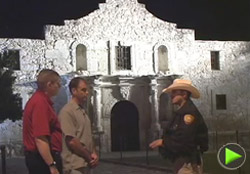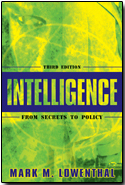Unit 2 Introduction - Intelligence and Security

Click on the image above or the link below to
automatically play the streaming Quicktime movie in new window.
(Quicktime streaming file - length 2:20)
Use the following link to listen to an audio version of the unit introduction
(Unit2.mp3 file - size 1.1 mb - length 2:20)
Lesson Overview
 This lesson will take a broad look at the history, organizations, and functions of the US intelligence community. Let me give you fair warning that this week is primarily a reading week. We are going to leverage the knowledge and experience of Mark Lowenthal who wrote your textbook Intelligence: From Secrets to Policy now in its third edition. Dr. Lowenthal has thirty years of intelligence experience in both the executive and legislative branches of government as well as the private sector. He retired in 2005 from the government having served three years as both the Assistant Director of Central Intelligence for Analysis and Production and Vice Chairman of the National Intelligence Council for Evaluation. He now runs a national security education, training, and consulting firm called the Intelligence and Security Academy and he is an adjunct professor at Columbia University.
This lesson will take a broad look at the history, organizations, and functions of the US intelligence community. Let me give you fair warning that this week is primarily a reading week. We are going to leverage the knowledge and experience of Mark Lowenthal who wrote your textbook Intelligence: From Secrets to Policy now in its third edition. Dr. Lowenthal has thirty years of intelligence experience in both the executive and legislative branches of government as well as the private sector. He retired in 2005 from the government having served three years as both the Assistant Director of Central Intelligence for Analysis and Production and Vice Chairman of the National Intelligence Council for Evaluation. He now runs a national security education, training, and consulting firm called the Intelligence and Security Academy and he is an adjunct professor at Columbia University.
My teaching approach this week is to have you read six chapters from the textbook. Fortunately this book is very well written, the chapters are concise (short and to the point), and I found it very interesting and enjoyable reading. I want you to read the book in conjunction with the online lesson. I will provide a brief pre-read commentary for each chapter that asks you to contemplate several questions as you read. After you have read the chapter there is a mini-quiz to reinforce your knowledge. You must get 100% on each mini-quiz (you can take them as many times as necessary) to demonstrate to yourself that you have mastered the basic ideas. Once you have achieved 100% on the mini-quizzes, Lesson 04 - GRADED Quiz (#2) will unlock and you can take that quiz one time for your lesson grade.
This lesson also includes an online discussion area. The discussion this week is optional, however, I would encourage all students to contribute some ideas and questions to the forum. Students with insider knowledge might be able to share some of their perspectives and help answer the questions of other students. Of course, student input that challenges the ideas in the readings are always welcome as well. My hope is that you are so interested in this topic that you will take the extra time to reflect on this chapter with your classmates.